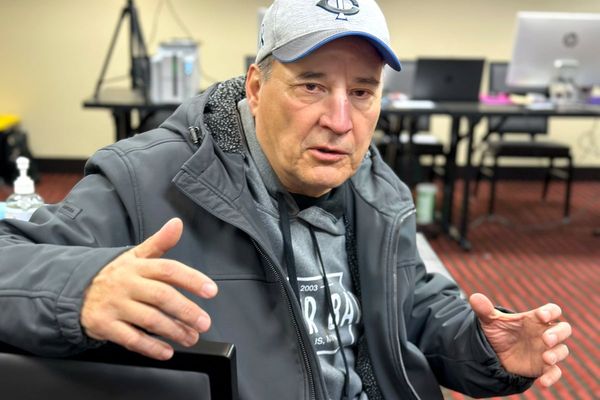
It’s been less than a month since Australia’s federal election, but there has been a tangible change in the national climate under the new Albanese government. The challenge now is to bottle it.
The news of the world may still be scary, but it feels like the new government is approaching these looming crises as problems to be confronted and resolved rather than opportunities to divide.
Part of this change in climate is the product of more humane policy: under an Albanese government performative cruelty has been jettisoned, allowing an exiled family to return to a community that embraced them.
Some is simply a consequence of a more competent approach: under an Albanese government, neighbours seem reassured, allies embraced, differences moderated rather than weaponised.
Others may be wholly imagined: under an Albanese government, a substitute goalie does a crazy dance and somehow the Socceroos make the World Cup finals!
Whatever its source, this change in climate is palpable, a valuable resource for the incoming government – and the broader progressive movement in general – to mine, refine and use to power long-overdue reform in this country.
This week’s Guardian Essential report confirms this vein of goodwill, most notably in the way our new prime minister has experienced a 40-point improvement in his personal approval.
While all election winners experience a post-poll honeymoon, none has had this sort of turnaround since we began polling. Tony Abbott and Scott Morrison had double-digit improvements after their victory speeches, but the dramatic shift in attitudes to Anthony Albanese speaks to something deeper.
After what could only be described as a sustained “meh” in opposition, the new PM is leading with an understated modesty in stark contrast to his predecessor’s manic majesty.
In three short weeks the doubters have come on board, the naysayers have opened their minds and Albanese is governing with the goodwill of a strong majority of Australians.
Likewise, our collective views of the track our nation is heading on has shifted markedly since election day, with a 23% net collapse in national gloom from net-negative two to net-positive 21.
None of which is to minimise the crises the incoming government are facing: from instability in the region, flow-on from the Ukraine war, our pandemic-ravaged economy, the neglect of the NDIS and aged care, the failing hospital system. And most of all, from a needless decade of climate denial and inaction.
The challenge for those of us who want to see a long-term progressive government is to harness this positive mood shift, not to pretend away these problems with a magic wand, but to own them, share them and work our way through them.
One of the assets available for this government is its capacity to work with civil society, the charities, not-for-profits and unions that were deliberately and methodically hamstrung through the last nine years of Coalition rule.
Part of the architecture of the conservative government was to stymie civil society: from the trade union royal commission’s political show trials, to restrictive third-party electoral laws, to the charities commission operating like a noose around the necks of charities and not-for-profits.
In doing so, the Morrison government did not simply stifle dissent, it robbed itself of the important stabilising energy of what economist John Kenneth Galbraith dubbed “countervailing power”, the institutions that have always supported good public policy by mitigating the power of the market and providing feedback loops and early warning systems.
You can’t design an energy transition when the cards are all held by the incumbent power players. You can’t design foreign policy without the voices of those who deliver the soft power of foreign aid and development. You can’t reform aged care and the NDIS without the input of those who receive and deliver the services.
At a post-election gathering of more than 200 of these civil society leaders held in Old Parliament House last week under the auspices of the Centre for Australian Progress, incoming assistant charities minister Andrew Leigh committed to ending this nine-year war on the sector.
The new mood of perestroika in the room was infectious but not triumphant, more a steely determination to take the opportunity to work with a progressive government full of committed people ready to face these big challenges.
The recurring theme of the gathering was collaboration: establishing the capacity to not just campaign government to demand change, but to work with government to maintain consensus for its energy and broader economic reform agenda.
This is no easy task. Charities, unions and not-for-profits are powered by the energy of conflict and the urgency of crisis every bit as much as politicians and the media, the fundraising and marketing teams rolling out the well-worn template of anger, hope and action to excite and attract paying members.
Are there alternate ways to bring these organisations to the table and prove value by participating in processes that don’t end with a higher target or a pay rise or a major court victory?
It won’t all be Kumbaya. There will be inevitable points of friction as Labor balances its current mandate, the demands of the Greens and some teals for greater climate ambition and a political calculus that sees long-term power in holding its outer metropolitan and regional seats.
With the right structures, though, this tension can be managed and even harnessed into better policy, providing it doesn’t descend into the tired politics of anger and personal attack that drags everyone down.
And should relations strain under the realpolitik, the new prime minister has gifted us a unifying project to all lean into, with a vote on an Indigenous voice to parliament to be held before the next federal election.
It’s very early days for the Albanese government but the current moment, if seized, could be a once-in-a-generation opportunity to restore civility to the Australian discourse and build a solid base for long-term progressive government.
• Peter Lewis is an executive director of Essential, a progressive strategic communications and research company







